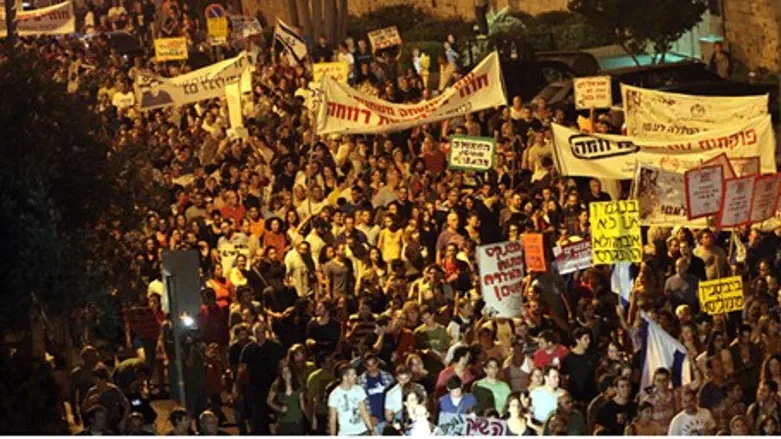
Israelis marched late Saturday in an echo of mass cost of living protests in 2011, but this time their ire focused on finance minister Yair Lapid who came to power in January on the coattails of that protest movement.
2,000 people gathered in central Tel Aviv, an AFP journalist said, to protest against an austerity budget due for cabinet debate on Monday.
The budget is expected to raise income tax and VAT while slashing government spending, including social benefits.
Rallies were also scheduled for Jerusalem, Haifa and elsewhere on Saturday, but local media reported just 150 taking part in Haifa and even fewer in Jerusalem.
Protesters in Tel Aviv carried banners reading "Take from the tycoons, not us," referring to the plan to raise workers' income tax by 1.5 percent while increasing corporate taxes by one point.
Lapid insists that caution is needed in order not to drive employers abroad.
"Who are you demonstrating against? Are your demonstrating so that you can lose your jobs, so that the economy will collapse? You are demonstrating against yourselves," he said in an interview aired on Friday by privately owned Channel 2 television.
It was a reversal of roles for Lapid who tapped into middle class grievances to take his newly minted Yesh Atid party to striking success in its
first ever election campaign, becoming the second-largest party in parliament and a partner in Prime Minister Binyamin Netanyahu's coalition government.
The 2011 protests saw record numbers of Israelis from all walks of life come together in unusual solidarity, peaking on September 3, when half a
million people took to the streets. While items on Arutz Sheva warned that the protests were being organized by the extreme left wing, liberal media encouraged citizens to take part in them. Communist activists boasted in an interview more than a year later that they had, indeed, been the force that fomented those protests, and the ultra-leftist New Israel Fund also took credit for them.
The protests pressured the government into adopting certain socialistic policies that wound up slowing down the economy and hurting the very press outlets that had breathlessly encouraged them.